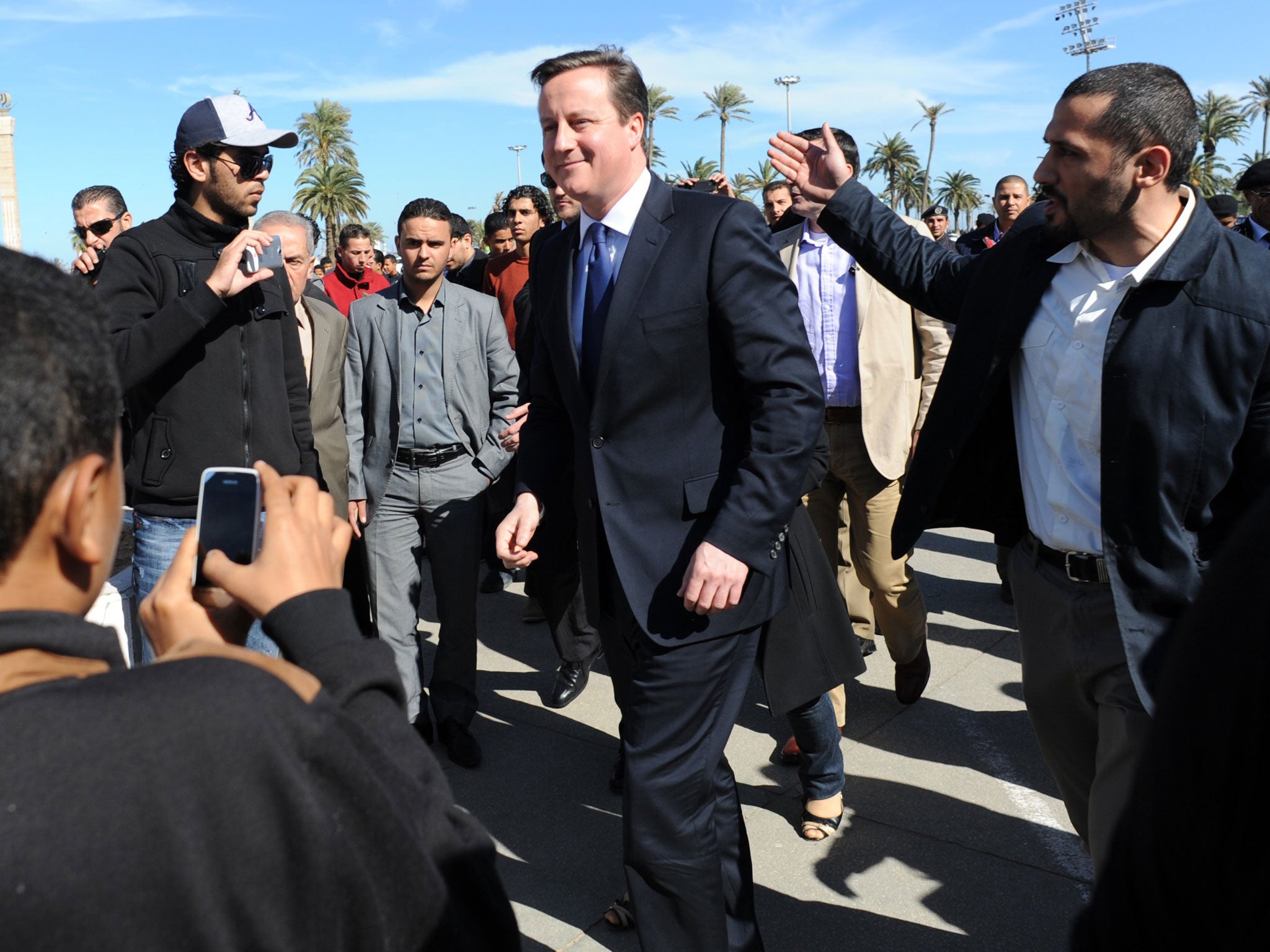Cameron and Miliband are as bad as each other… they both knew they couldn’t save Libya from the chaos of Colonel Gaddafi
'You do the fighting, I will do the talking', the Prime Minister told one General


Foreign policy, which has been markedly absent so far from the British election campaign, has emerged amid accusations and recriminations.
Ed Miliband charged that continuing refugee disaster in the Mediterranean was due to David Cameron’s neglect of Libya following the overthrow of Muammar Gaddafi. The Conservatives accused the Labour leader for the “shameful and absolutely unacceptable “ inference that the Prime Minister was personally responsible for the drowning of hundreds of people.
To recap: the air campaign in Libya followed a UN Security Council resolution authorising the establishment of a ‘no-fly zone’ and safeguarding civilians. Russia and China voted for the resolution; what they did not foresee was that the West would use the resolution to carry out an air-war, direct combat going way beyond what was needed for a ‘no-fly zone’, lasting months against the regime.
Ed Miliband supported the bombing. He said at the time “We could not stand-by as Colonel Gaddafi murdered his own people…That’s why I said to the Prime Minister that it was right to take part in this international action, backed by the UN”. He also said it was “not a mandate for regime change”. But there was little criticism from him and Labour frontbenchers when regime change did actually take place.
I spent most of the civil war reporting from Libya. It was absolutely clear that the rebels would not have won so relatively quickly without Western military intervention. Just look how long the bloody strife in Syria has continued without such an intervention. The Russians and the Chinese, having learned from what happened in Libya, have blocked all attempts at the UN for a "no-fly zone" in Syria. There seems little chance that Bashar al-Assad will end up like Gaddafi.
Britain and France, David Cameron and Nicolas Sarkozy, rather than the US, were the driving forces behind the Libya campaign. During return visits to London I would hear how, before air strikes began, Mr Cameron would demand that "something must be done" at National Security Council meeting. Senior commanders, like General Sir David Richards, the highly respected Chief of Defence Staff, stressed the need for a longer term strategy and the overstretch facing the British militay. The Prime Minister’s response was “I tell you what, you do the fighting, I will do the talking.”
Despite all that, on the ground in Libya it was the French more than the British who were regarded as saviours by the opposition. Air strikes became known as ‘Sarkozies’. When Mr Sarkozy and Mr Cameron came to Tripoli in September 2011 after the fall of the regime, it was the French president who walked into the press conference hand in hand with the new prime minister, Mahmoud Jibril, with Mr Cameron almost running to keep up.
The toll of death and destruction was not particularly high in the Libyan revolution and the first elections afterwards went remarkably smoothly with a high turnout. But there was virtually no contribution from France and Britain, as well as the rest of the West, to help enforce security as the country split into rival cantons with armed militias. The criminal gangs smuggling migrants which had been kept in check during Col Gaddafi’s time of rapprochement with West before the revolution began to flourish.
Mr Cameron had promised that Britain will stand-by the Libyan people, but instead Britain walked away from the unfolding chaos. There was no appetite for nation building after the long wars in Iraq and Afghanistan. And, in any case, with relentless defence cuts, the resources simply were not there to do so.
Some Libyan fighters were belatedly brought to the UK, at Downing Street’s instigation, for training. But the scheme collapsed and they were sent home in disgrace after misbehaviour and criminal acts by some of the recruits.
Would things have been different with Mr Miliband as prime minister? Not unless Labour had made no defence cuts and also put boots on the ground in Libya, both unlikely scenarios. According to reports, Mr Miliband had only mentioned Libya once since 2013 —- in a press release.
Join our commenting forum
Join thought-provoking conversations, follow other Independent readers and see their replies
Comments
Bookmark popover
Removed from bookmarks